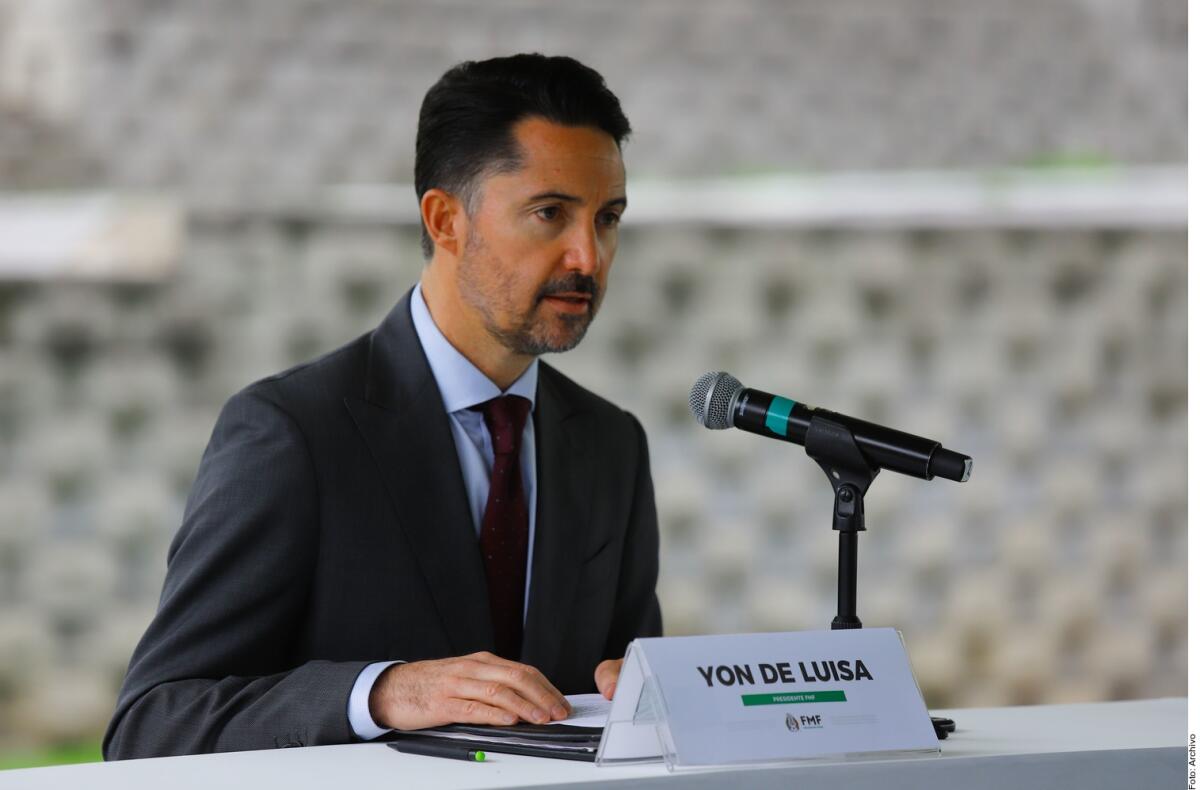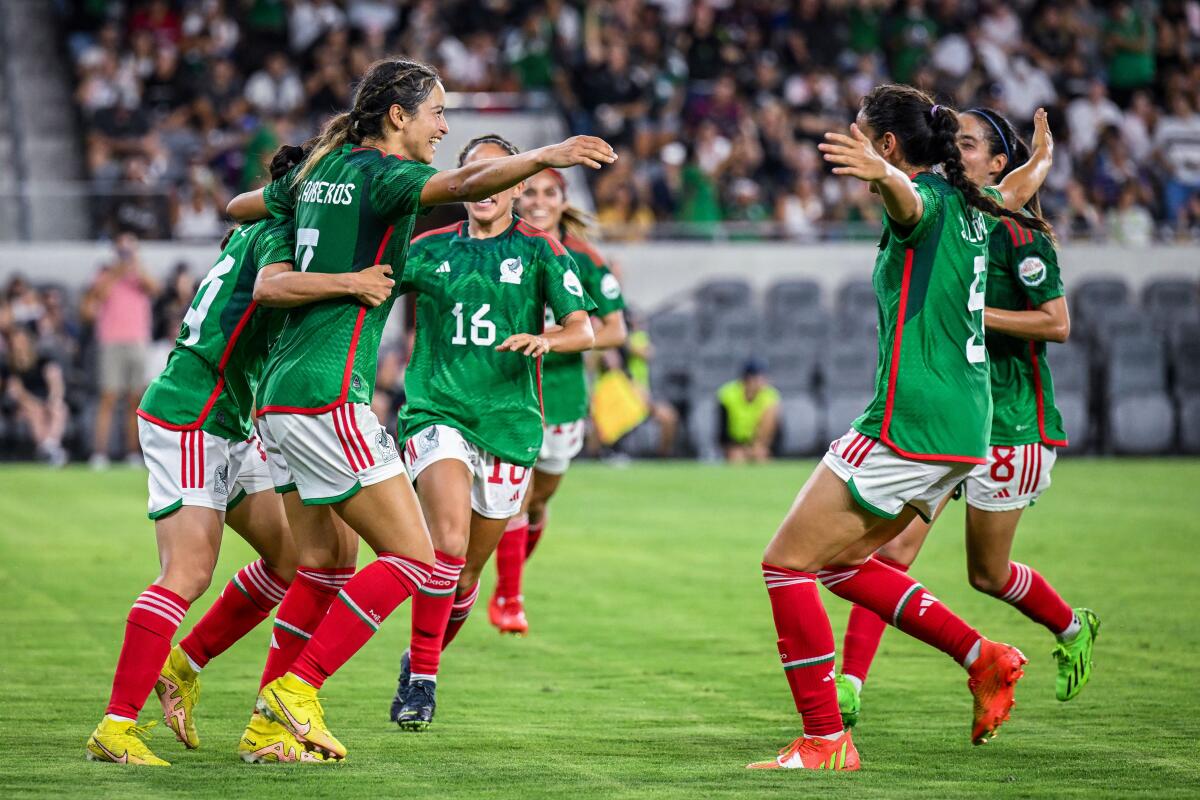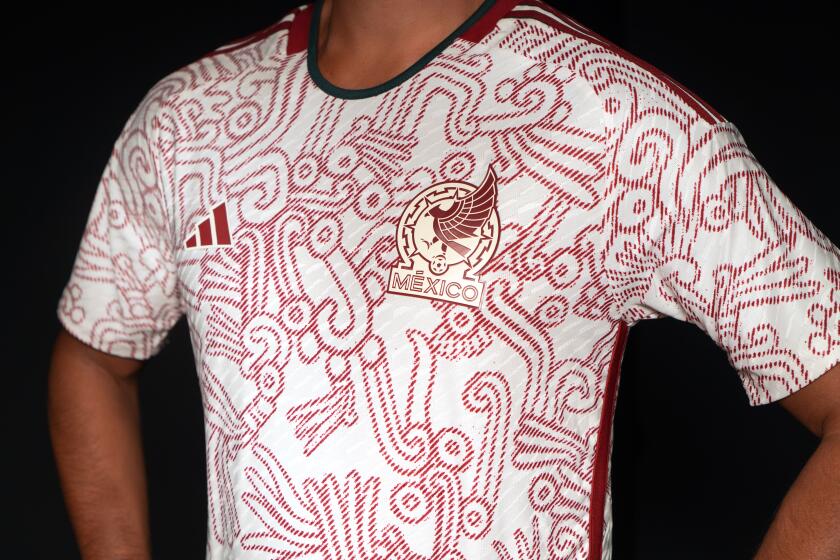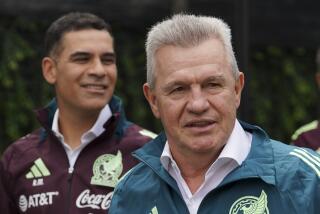News Analysis: With Mexico soccer in a dire state, its president aims for a miracle comeback

- Share via
Yon de Luisa was wearing a bright green Mexican national team polo shirt and an even brighter smile when he entered Banc of California Stadium on Monday, less than two hours before El Tri’s women’s team beat Angel City 2-0 in an exhibition.
He hardly looked like a man carrying the weight of his country’s World Cup hopes on his shoulders. But then looks can be deceiving. As the embattled president of Mexico’s soccer federation, De Luisa is taking criticism from all sides — not all of it deserved — less than three months before his woefully underperforming men’s team is scheduled to kick off in Qatar.
Mexico’s coach, Tata Martino, picks the team’s roster and the playing style, and he hasn’t done a good job with either lately. Club owners in the country’s top domestic leagues have final say over the agenda and control the purse strings. De Luisa is left to clean up the mess and explain how it happened.
Michael Erush was named Cal State L.A. men’s soccer coach weeks after the Golden Eagles won the NCAA Division II title. His lineup features many new faces.
And lately he’s had a lot to answer for with the federation in crisis, having lost its identity and its way at the worst time.
Including age-group teams, Mexico hasn’t won a trophy on the men’s or women’s side since the 2019 CONCACAF Gold Cup, its longest drought in 15 years. In July, after Mexico failed to qualify for the men’s and women’s Olympic tournaments in 2024 and the 2023 Women’s World Cup, De Luisa fired Ignacio Hierro, the director of national teams, and Luis Perez, the U20 coach, and forced the resignation of sporting director Gerardo Torrado.
Over the next month, he also fired most of the top coaches on the women’s side, including senior national team manager Monica Vergara. Twenty months earlier, De Luisa had put female coaches in charge of Mexico’s top three women’s teams for the first time. Two of the three are now gone.
The timing, De Luisa acknowledged Monday, wasn’t ideal.
“If I could do it again, I would do it earlier,” he said. “At the end, what we are doing is we’re designing a stronger sports area within the federation.”

Before the change, the federation was an extremely vertical organization, he said, with one person in charge of all national teams. Under the new structure, Jaime Ordiales, a former national midfielder, will run the men’s teams and Andrea Rodebaugh, who played on Mexico’s first World Cup squad in 1999, will be responsible for the women. Pedro López, who led Spain to a U20 women’s World Cup title last month, will be named coach of Mexico’s senior team shortly, De Luisa said.
That made Monday’s game, an unusual one in that it matched a national team against a club team, the final bow for interim coach Christopher Cuéllar. The win over Angel City — the scores coming on an own goal from Megan Reid in the 72nd minute and a left-footed strike from former UC Irvine standout Scarlett Camberos five minutes later — was the first for the women’s team in six games dating to June. That slide was a massive disappointment for a team that entered last July’s World Cup and Olympic qualifying tournament in Mexico on its best run of form in a decade.
A week earlier, Mexico’s U20 men’s team was eliminated in the quarterfinals of the CONCACAF Championship, costing it a berth in the Olympics, a tournament it has medaled in twice since 2012. With the alarm bells ringing, De Luisa could no longer afford to wait to make the changes he believed were already long overdue.
A former president of Club América and former vice president of Televisa Deportes, De Luisa, 52, helped bring the 2026 World Cup to North America as Mexico’s representative on the united bid committee. A month later, he was named president of a national soccer federation in transition, bringing on a new coach in Martino and introducing his first organization overhaul, one that ended last fall with the first rebranding of the federation’s badge in 33 years.

The modernization was necessary, but it hasn’t always gone well.
“It doesn’t look good for the future,” groused one former executive who asked that his name not be used.
It doesn’t look good for the present either. The men’s team has won just one of its last five and has scored a goal or fewer in nine of its 13 games this year. With the Qatar World Cup approaching, that’s not encouraging — something Mexico’s fans acknowledged when they booed the team off the field after it latest loss last week.
“As strong and passionate a fan base as we have, that is normal,” De Luisa said. “It’s normal before the World Cup to have this type of feedback. But it’s not the president of the federation, it is the entire federation that tries to work on our short-term, midterm and long-term objectives.
Mexico unveiled its away kit for this fall’s World Cup in Qatar that reflects the country’s pre-Hispanic memory and current-day cultural touchstones.
“We’re always trying to do to win everything we participate in. The Mexican fan base is used to [having] winning periods, and that’s good.”
The fan base also is used to the team getting to the knockout round of the World Cup, something Mexico has done in every tournament it’s played in since 1978. That streak could end this fall, after which De Luisa is scheduled for a performance review.
“How this works is that after each World Cup, there’s a board meeting where they decide if the management will continue or not,” he said.
De Luisa will need a miracle in Qatar to keep his job. The changes he’s instituted, however, will continue. And that legacy might last longer than the memories of one World Cup.









